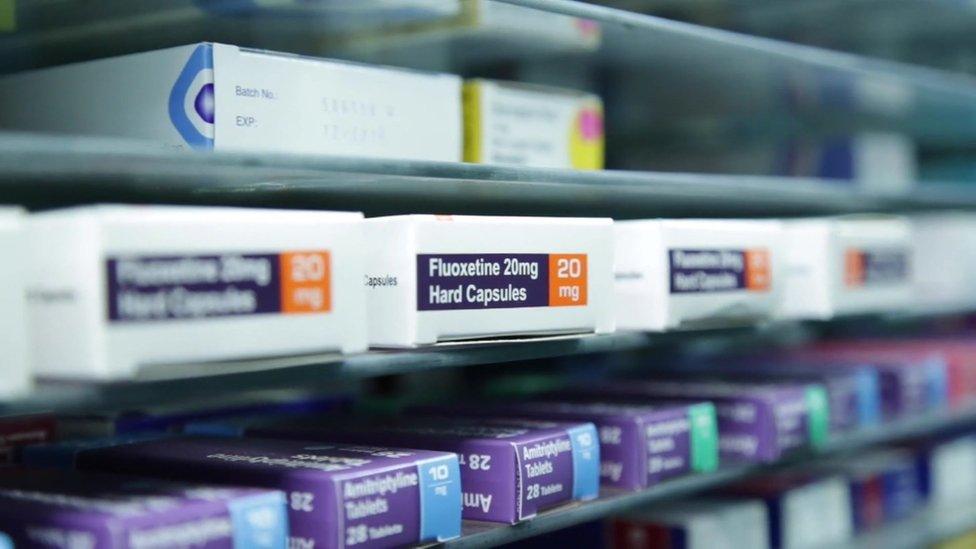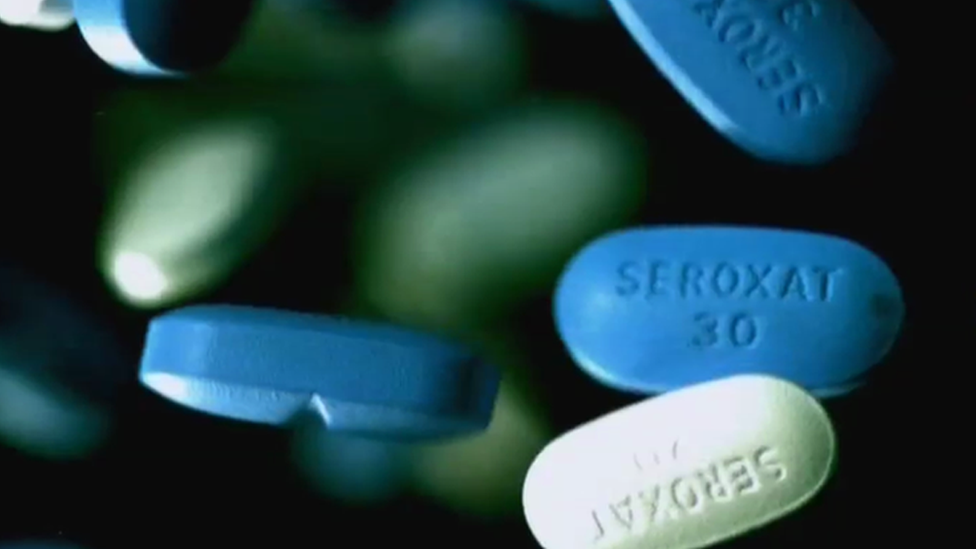The 'extreme' side-effects of antidepressants
- Published
Claire Hanley says she tried to take her own life twice after taking antidepressants
People who say their lives have been ruined by commonly prescribed antidepressants, known as SSRIs, are taking their case to Parliament on Wednesday. Some users say the tablets have made them suicidal.
"I was getting seizure-like symptoms, where my muscles were jolting around of their own accord," Claire Hanley tells the BBC's Victoria Derbyshire programme, explaining the effects she says antidepressants had on her body.
She had begun taking them while caring for her seriously ill mother and studying for her final exams at Cambridge University, but suffered severe side-effects after her GP prescribed a stronger dose of tablet.
"Within two weeks I'd tried to take my own life twice," she says.
"I felt disorientated and sick and had digestive problems and infections, it was really extreme. I don't even know how to begin. All I can remember is being on the bedroom floor in a kind of semi-conscious state having seizure after massive seizure."
It has been 20 years since she first took the tablets, but Ms Hanley says she still suffers from the consequences of a cocktail of drugs doctors have prescribed to try to treat the side-effects of the original antidepressants.
She says she has constant muscle ache and fatigue, and spends most days in bed.

Find out more
The Victoria Derbyshire programme is broadcast on weekdays between 09:00 and 11:00 on BBC Two and the BBC News channel.

It is thought about one in 100 people experiences severe side-effects as a result of taking SSRIs.
The drugs are designed to increase serotonin levels in the brain, which can improve symptoms of depression.
Some experts, however, now believe many more people than was previously thought are suffering negative consequences.
Prof David Healy, from the psychiatric unit at Bangor University, believes the drugs make "one in four people become more anxious, rather than less".
"Some people become very agitated and some go on from that to become suicidal," he says.
"The drugs can become the problem that they're then used to treat."

Dr Sarah Jarvis believes for most people, the benefits outweigh the risks
The drugs companies have declined to comment, but Dr Sarah Jarvis, a GP in West London, is keen to point out that doctors do not prescribe antidepressants lightly.
She also stresses the vital role they can play in helping people with depression - saying, if untreated, "moderate depression and severe depression wreck lives, and very regularly cost lives".
Dr Jarvis adds that for most people, the drugs are effective.
"I think for people with severe depression, they may need to try two or three [different types of antidepressant] before they find one that does work for them, but for most people we can find a medicine which will help them and for whom the benefits will outweigh the risks," she says.

Antidepressants
Antidepressants cost the NHS £780,000 per day
Between 2005 and 2012, there was a 54% increase in the number of children prescribed antidepressants in the UK
Common side-effects include dizziness, headaches and feeling sick. These generally improve with time
Antidepressants can cause serotonin syndrome, which - while uncommon - can lead to seizures, an irregular heartbeat and unconsciousness in the most severe cases
In rare instances, some people experience suicidal thoughts and a desire to self-harm when they first take antidepressants. People under the age of 25 seem particularly at risk
Sources: Health and Social Care Information Centre, World Health Organization, NHS Choices

But according to some experts, such as Prof David Healy, the side-effects of antidepressants are not just felt when someone is taking them, but also when they try to reduce the dose or come off the tablets altogether.
"There's a large number of people - and it seems to be more women than men - who have great difficulties trying to reduce the dose," he says.
"And if they halt the treatment, they can become terribly agitated, they can become suicidal."
"When you look at the clinical trials that have been done, the taper phase - the point where the person is trying to come off the drug - is the riskiest period.
"That's the point where the person is most likely to commit suicide, or the most likely to do terrible things."

Prof David Healy says some people experience dangerous withdrawal symptoms when coming off antidepressants
Gemma - not her real name - says her withdrawal symptoms were so bad that she is now back on the tablets.
"I was told I could come off [antidepressants] no problem," she says.
"But I was in a mess basically. I reached a point where I could barely function. I was incredibly anxious - I was highly anxious all the time, so I was very panicky, very agitated. I could barely sleep."
Gemma had followed medical advice and come off the tablets slowly, but she suffered severe consequences nevertheless.
She says: "I was petrified. I was crying my eyes out. I didn't know what on Earth was happening to me. I guessed it could be the medication, but I thought I had some kind of terminal illness. I just didn't know what was happening."
Gemma eventually decided to go back on the drugs, and the withdrawal symptoms quickly disappeared.
"I was shocked. All the migraines, the muscle aches - everything - just stopped instantly," she says.

Your messages

Withdrawal symptoms usually occur within five days of stopping the tablets, and generally last for up to six weeks.
Many people find the effects manageable, but others - some of whom got in contact with us - say they have been severely affected. Here are a few.
Brigitte, from Exeter, said: "I couldn't walk and was experiencing the most horrendous sensory sensations. My muscles were burning, I had facial twitches, terrible night sweats and numbness on my forehead."
Pauline, from Hertfordshire, said: "I look and feel like a drug addict, I can't focus my eyes. My eyes are like slits even if I've not been crying. I cannot sleep at all, and because it seems my body realises it is not getting the drug, every day is living hell."
Christine said: "The fatigue is so bad that I have to go to bed in the afternoons and can do very little. I feel dizzy, nauseous, have blurred vision and a headache at the back of my head and on top."
But others believe people who need medication should not be put off by those who have experienced severe symptoms.
Mehran, from south-east London, said: "I have been on and off antidepressants for over a decade. It is only natural to have withdrawal effects as the brain becomes comfortable with a certain level of chemicals. Usually, those people, like myself, who withdrew abruptly actually still needed the medication. I worry [that the stories of those with severe symptoms] put fear into the people that need medication."
Mark, from London, said: "[When I started taking antidepressants] I did feel more, rather than less, anxious for the first two to three weeks - which was accompanied by muscle twitches, nausea and a general feeling of dissociation. But then I felt fine, I could function again and I got better. I believe SSRIs provided a crutch to support me through a difficult time, while I worked on finding a longer-term solution using psychotherapy." Mark does not recall experiencing any withdrawal symptoms.

For Dr Jarvis, however, while some individuals may suffer prolonged side-effects from antidepressants - lasting months or, on occasion, years - she would be surprised if all of the reported effects related to the tablets.
"What we need to bear in mind is that some patients who have taken these have been very vulnerable, they've been very anxious and it can be very difficult to tell what is anxiety and what is the tablets," she says.
But for Ms Hanley, the dangers must be taken more seriously by medical professionals.
"It may be a minority of people who have these extreme reactions, but they exist," she says.
"If you look at the leaflets in the packets, and it says one in 100 will have this symptom, they've got to realise that that one person could be their patient. It does happen."
- Published8 March 2016

- Published5 July 2016

- Published15 February 2016
